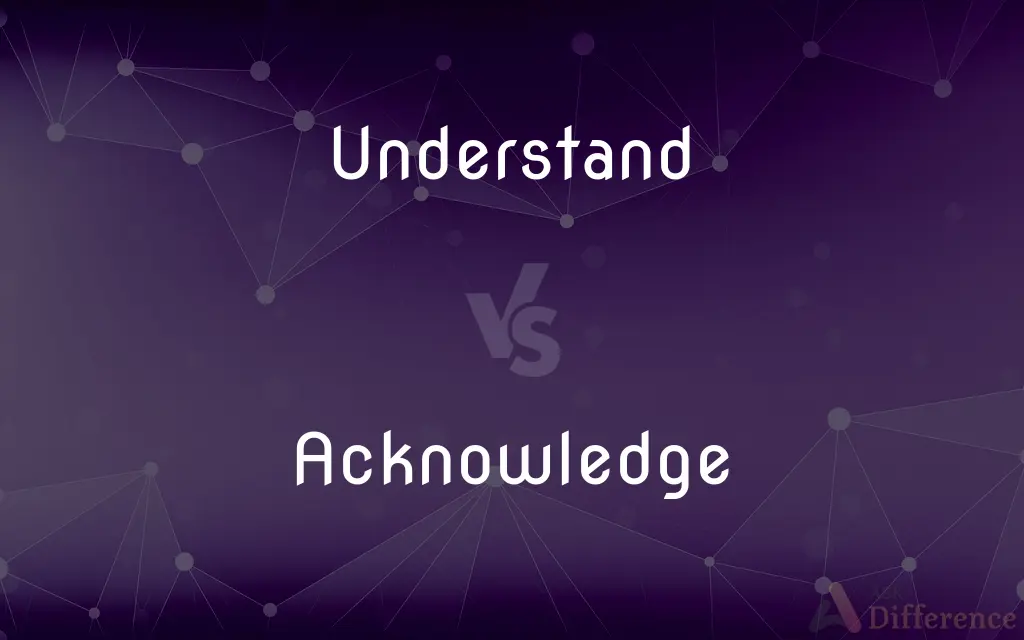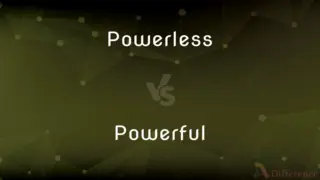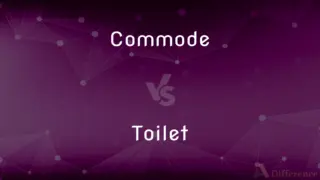Understand vs. Acknowledge — What's the Difference?
By Maham Liaqat & Fiza Rafique — Updated on March 26, 2024
Understanding involves comprehending or grasping the meaning of something, while acknowledging is recognizing or admitting the existence or truth of something.

Difference Between Understand and Acknowledge
Table of Contents
ADVERTISEMENT
Key Differences
Understanding refers to the cognitive process of making sense of a concept, situation, or language, indicating a deeper level of cognitive engagement. It involves grasping the meaning, significance, or nature of something. Acknowledging, on the other hand, does not necessarily imply a deep comprehension but rather the acceptance or admission of the existence, validity, or truth of something without requiring full understanding.
When you understand a concept, it means you have assimilated the information in a way that allows you to make connections, apply the knowledge, or explain it to others. Whereas acknowledging something might be as simple as recognizing its presence or admitting that a fact is true, without the need to fully grasp its underlying principles or implications.
Understanding often requires a process of learning, analysis, and reflection to fully appreciate the depth and breadth of a subject. Acknowledgement can be more immediate, sometimes requiring only the recognition of certain facts or situations as they are presented, without delving into their complexities.
In the context of interpersonal relationships, understanding someone implies a deep grasp of their feelings, thoughts, or motives. Acknowledging someone in this context means recognizing their feelings or viewpoints as valid, which is an important aspect of communication and respect, but does not necessarily mean one fully comprehends the other's experience.
Both understanding and acknowledging are crucial in communication and learning. Understanding paves the way for in-depth knowledge and skills development, while acknowledging is vital for validation, agreement, or the initial steps towards conflict resolution or learning.
ADVERTISEMENT
Comparison Chart
Definition
Grasping the meaning or principle of something.
Recognizing or admitting the existence or truth of something.
Process
Involves learning, analysis, and reflection.
Can be immediate, involving acceptance or admission.
Depth
Indicates deep cognitive engagement and comprehension.
Does not necessarily imply comprehension.
Application
Applied to concepts, situations, language understanding.
Applied to facts, presence, existence, or truth recognition.
Interpersonal Context
Implies a deep grasp of feelings, thoughts, motives.
Involves recognizing or validating feelings or viewpoints as valid.
Compare with Definitions
Understand
To grasp the meaning, significance, or nature of something.
She understands the complex theory after studying it for weeks.
Acknowledge
To show that one has noticed or recognized someone, often by a gesture.
She acknowledged her colleague with a nod as she entered the room.
Understand
To realize the intention or background of a person or situation.
They understand why the decision was made, given the circumstances.
Acknowledge
To recognize the existence or truth of something.
He acknowledged the challenges ahead but remained optimistic.
Understand
To comprehend the language or words being used.
He understands Spanish better than he speaks it.
Acknowledge
To admit the truth or existence of.
The company acknowledged the mistake and promised to correct it.
Understand
To hold knowledge or comprehension of a subject.
The student understands mathematics well enough to teach it.
Acknowledge
To express recognition of or gratitude for.
They acknowledged the support they received from the community.
Understand
To perceive the intended meaning or cause.
She understood the joke after it was explained to her.
Acknowledge
To accept or admit the existence or truth of a situation.
Acknowledging one's feelings is the first step towards dealing with them.
Understand
Perceive the intended meaning of (words, a language, or a speaker)
He didn't understand a word I said
She understood what he was saying
He could usually make himself understood
Acknowledge
Accept or admit the existence or truth of
The plight of the refugees was acknowledged by the authorities
The government acknowledged that the tax was unfair
‘That's true,’ she acknowledged
Understand
Interpret or view (something) in a particular way
As the term is usually understood, legislation refers to regulations and directives
Acknowledge
Recognize the importance or quality of
The hotel is widely acknowledged as one of Cornwall's finest
The art world has begun to acknowledge his genius
Understand
Be sympathetically or knowledgeably aware of the character or nature of
I understand how you feel
Picasso understood colour
Acknowledge
Show that one has noticed or recognized (someone) by making a gesture or greeting
She refused to acknowledge my presence
Understand
To become aware of the nature and significance of; know or comprehend
She understands the difficulty involved.
Acknowledge
To admit the existence or truth of
The doctors acknowledged that the treatment had not been successful.
Understand
To become aware of the intended meaning of (a person or remark, for example)
We understand what they're saying.
We just disagree with it. When he began describing his eccentric theories, we could no longer understand him.
Acknowledge
To express recognition of; make notice of
"When he saw me acknowledge him, he smiled as if we were dear friends" (Angela Patrinos).
Understand
To know and be tolerant or sympathetic toward
Hoped that they would understand my complaint.
Acknowledge
To express gratitude or appreciation for or to
Acknowledged the contributions of the volunteers.
Acknowledged her editor in the preface to the book.
Understand
To know thoroughly by close contact or long experience with
That teacher understands children. I understand the basics of car repair.
Acknowledge
To report the receipt of (something) to the sender or giver
Acknowledge a letter.
Understand
To learn indirectly or infer, as from hearsay
I understand his departure was unexpected. Am I to understand you are staying the night?.
Acknowledge
(Law) To accept or certify as legally binding
Acknowledge a deed of ownership.
Understand
To assume to be or accept as agreed
It is understood that the fee will be $50.
Acknowledge
(transitive) To admit the knowledge of; to recognize as a fact or truth; to declare one's belief in
To acknowledge the being of a god
Understand
To supply or add (words or a meaning, for example) mentally
A verb is understood at the end of the statement "Yes, let's.".
Acknowledge
(transitive) To own or recognize in a particular quality, character or relationship; to admit the claims or authority of; to give recognition to.
Understand
To have understanding, knowledge, or comprehension.
Acknowledge
(transitive) To be grateful of (e.g. a benefit or a favour)
To acknowledge a favor
Understand
To have sympathy or tolerance
You're upset. I understand.
Acknowledge
(transitive) To report (the receipt of a message to its sender).
This is to acknowledge your kind invitation to participate in the upcoming debate.
Understand
To learn something indirectly or secondhand; gather.
Acknowledge
(transitive) To own as genuine or valid; to assent to (a legal instrument) to give it validity; to avow or admit in legal form.
Understand
(transitive) To grasp a concept fully in one's mind, especially (of words, statements, art, etc.) to be aware of the meaning of and (of people) to be aware of the intent of.
I'm sorry. I don't understand.
Please try to understand. It's not you, it's me.
Acknowledge
To own or admit the knowledge of; to recognize as a fact or truth; to declare one's belief in; as, to acknowledge the being of a God.
I acknowledge my transgressions.
For ends generally acknowledged to be good.
Understand
To believe, to think one grasps sufficiently despite potentially incomplete knowledge.
I understand that you have a package for me?
In the imperative mood, the word “you” is usually understood.
Acknowledge
To own or recognize in a particular character or relationship; to admit the claims or authority of; to give recognition to.
In all thy ways acknowledge Him.
By my soul, I'll ne'er acknowledge thee.
Understand
To stand underneath, to support.
Acknowledge
To own with gratitude or as a benefit or an obligation; as, to acknowledge a favor, the receipt of a letter.
They his gifts acknowledged none.
Understand
To have just and adequate ideas of; to apprehended the meaning or intention of; to have knowledge of; to comprehend; to know; as, to understand a problem in Euclid; to understand a proposition or a declaration; the court understands the advocate or his argument; to understand the sacred oracles; to understand a nod or a wink.
Speaketh [i. e., speak thou] so plain at this time, I you pray,That we may understande what ye say.
I understand not what you mean by this.
Understood not all was but a show.
A tongue not understanded of the people.
Acknowledge
To own as genuine; to assent to, as a legal instrument, to give it validity; to avow or admit in legal form; as, to acknowledge a deed.
Understand
To be apprised, or have information, of; to learn; to be informed of; to hear; as, I understand that Congress has passed the bill.
Acknowledge
Declare to be true or admit the existence or reality or truth of;
He admitted his errors
She acknowledged that she might have forgotten
Understand
To recognize or hold as being or signifying; to suppose to mean; to interpret; to explain.
The most learned interpreters understood the words of sin, and not of Abel.
Acknowledge
Report the receipt of;
The program committee acknowledged the submission of the authors of the paper
Understand
To mean without expressing; to imply tacitly; to take for granted; to assume.
War, then, war,Open or understood, must be resolved.
Acknowledge
Express recognition of the presence or existence of, or acquaintance with;
He never acknowledges his colleagues when they run into him in the hallway
She acknowledged his complement with a smile
It is important to acknowledge the work of others in one's own writing
Understand
To stand under; to support.
Acknowledge
Express obligation, thanks, or gratitude for;
We must acknowledge the kindness she showed towards us
Understand
To have the use of the intellectual faculties; to be an intelligent being.
Imparadised in you, in whom aloneI understand, and grow, and see.
Acknowledge
Accept as legally binding and valid;
Acknowledge the deed
Understand
To be informed; to have or receive knowledge.
I came to Jerusalem, and understood of the evil that Eliashib did for Tobiah.
Acknowledge
Accept (someone) to be what is claimed or accept his power and authority;
The Crown Prince was acknowledged as the true heir to the throne
We do not recognize your gods
Understand
Know and comprehend the nature or meaning of;
She did not understand her husband
I understand what she means
Understand
Perceive (an idea or situation) mentally;
Now I see!
I just can't see your point
Does she realize how important this decision is?
I don't understand the idea
Understand
Make sense of a language;
She understands French
Can you read Greek?
Understand
Believe to be the case;
I understand you have no previous experience?
Understand
Be understanding of;
You don't need to explain--I understand!
Common Curiosities
What does acknowledging something imply?
Acknowledging something implies recognizing or admitting its existence, validity, or truth, often without an in-depth understanding.
What role does understanding play in learning?
Understanding is fundamental to learning, as it enables the learner to assimilate information meaningfully, making connections and applying knowledge effectively.
Is understanding necessary for effective communication?
While understanding enhances communication by enabling deeper insight and connection, basic communication can occur with acknowledgment of facts or statements.
Why is acknowledgment important in relationships?
Acknowledgment is crucial in relationships as it validates the feelings, opinions, and experiences of others, fostering respect and open communication.
Can acknowledgment lead to understanding?
Acknowledgment can be the first step towards understanding, as recognizing the existence or truth of something can prompt further inquiry and learning.
Can you acknowledge something without understanding it?
Yes, it's possible to acknowledge facts or situations as true without fully grasping their underlying principles or complexities.
What does it mean to understand something?
Understanding something means comprehending its meaning, significance, or principles, indicating a level of knowledge that allows for application or explanation.
How does understanding differ from mere knowledge?
Understanding goes beyond mere knowledge by incorporating comprehension and the ability to apply or relate concepts, whereas knowledge might simply involve awareness of facts.
How do understanding and acknowledgment play roles in conflict resolution?
In conflict resolution, acknowledgment allows parties to recognize each other's perspectives as valid, while understanding facilitates deeper empathy and finding common ground.
How can teachers ensure students not only acknowledge but understand concepts?
Teachers can ensure understanding by engaging students in active learning, providing practical examples, encouraging questions, and assessing comprehension through application-based tasks.
Share Your Discovery

Previous Comparison
Powerless vs. Powerful
Next Comparison
Commode vs. ToiletAuthor Spotlight
Written by
Maham LiaqatCo-written by
Fiza RafiqueFiza Rafique is a skilled content writer at AskDifference.com, where she meticulously refines and enhances written pieces. Drawing from her vast editorial expertise, Fiza ensures clarity, accuracy, and precision in every article. Passionate about language, she continually seeks to elevate the quality of content for readers worldwide.














































